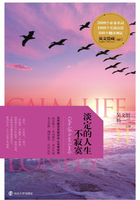
第2章 下一站幸福 (1)
尽管每个人对幸福的理解不同,但是幸福的含义是从来不变的。幸福不是发生在我们周围的事——而是我们如何去看待周围发生的事。秘诀就在于,我们以积极的心态面对逆境,变压力为动力。幸福并不是祈求我们所没有的,而是享受我们所拥有的。
通往幸福的旅途
Our Pursuit of Happiness
佚名 / Anonymous
We chase after it, when it is waiting all about us.
“Are you happy?” I asked my brother, Ian, one day. “Yes. No. It depends on what you mean.” He said.
“Then tell me,” I asked, “when was the last time you think you were happy?”
“April 1967.” He said.
It served me right for putting a serious question to someone who has joked his way through life. But Ian’s answer reminded me that when we think about happiness, we usually think of something extraordinary, a pinnacle of sheer delight—and those pinnacles seem to get rarer the older we get.
For a child, happiness has a magical quality. I remember making hide-outs in newly cut hay, playing cops and robbers in the woods, getting a speaking part in the school play. Of course, kids also experience lows, but their delight at such peaks of pleasure as winning a race or getting a new bike is unreserved.
In the teenage years the concept of happiness changes. Suddenly it’s conditional on such things as excitement, love, popularity and whether that zit will clear up before a prom night. I can still feel the agony of not being invited to a party that almost everyone else was going to. But I also recall the ecstasy of being plucked from obscurity at another event to dance with a John Travolta look-alike.
In adulthood the things that bring profound joy—birth, love, marriage also—bring responsibility and the risk of loss. Love may not last, sex isn’t always good, loved ones die. For adults, happiness is complicated.
My dictionary defines happy as “lucky” or “fortunate”, but I think a better definition of happiness is “the capacity for enjoyment.” The more we can enjoy what we have, the happier we are. It’s easy to overlook the pleasure we get from loving and being loved, the company of friends, the freedom to live where we please, and even good health.
I added up my little moments of pleasure yesterday. First there was sheer bliss when I shut the last lunch-box and had the house to myself. Then I spent an uninterrupted morning writing, which I love. When the kids came home, I enjoyed their noise after the quiet of the day.
Later, peace descended again, and my husband and I enjoyed another pleasure—intimacy. Sometimes just the knowledge that he wants me can bring me joy.
You never know where happiness will turn up next. When I asked friends what made them happy, some mentioned seemingly insignificant moments. “I hate shopping,” one friend said, “but there’s a clerk who always chats and really cheers me up.” Another friend loves the telephone, “Every time it rings, I know someone is thinking about me.”
I get a thrill from driving. One day I stopped to let a school bus turn onto a side road. The driver grinned and gave me thumbs up sign. We were two allies in a world of mad motorists. It made me smile.
We all experience moments like these. Too few of us register them as happiness.
Psychologists tell us that to be happy we need a blend of enjoyable leisure time and satisfying work. I doubt that my great-grandmother, who raised 14 children and took in washing, had much of either. She did have a network of close friends and family, and maybe this was what fulfilled her. If she was happy with what she had, perhaps it was because she didn’t expect life to be very different.
We, on the other hand, with so many choices and such pressure to succeed in every area, have turned happiness into one more thing we “gotta have”. We’re so self-conscious about our “right” to it that it’s making us miserable. So we chase it and equate it with wealth and success, without noticing that the people who have those things aren’t necessarily happier.
While happiness may be more complex for us, the solution is the same as ever. Happiness isn’t about what happens to us—it’s about how we perceive what happens to us. It’s the knack of finding a positive for every negative, and viewing a setback as a challenge. It’s not wishing for what we don’t have, but enjoying what we do possess.
我们四处追逐幸福,幸福其实就在我们身边。
一天,我问哥哥伊恩:“你感到幸福吗?”他回答说:“可以说幸福,也可以说不幸福,这要看你指什么了。”
“那你告诉我,”我说,“最近一次你感到幸福是什么时候?”
“1967年4月。”他答道。
我真不该对一个游戏生活的人提出这么严肃的问题。但伊恩的回答给了我一个启示:我们想到的幸福时刻通常是一些非同寻常的事,一种纯粹的快乐——但是随着年龄的增长,这种快乐好像越来越少了。
对一个孩子来说,幸福有着梦幻般的色彩。记得我曾在刚修剪好的干草丛中捉迷藏,在树林里玩“警察与小偷”,在学校的戏剧里扮演有台词的角色。当然,孩子也有情绪低落的时候。但是,因为赢得了一场比赛,或得了一辆新车,他们会毫不掩饰地快乐到极点。
到了青少年时期,幸福观逐渐转变。突然间,幸福就有了前提,你开始关注情绪,是否有爱,是否出名,甚至脸上的青春痘能否在舞会前消失。我清楚地记得,大家都去参加一个舞会,而我未被邀请时的痛苦。但也记得,在另一次活动中,与一个貌似约翰?特拉沃尔塔的人共舞,带给一个默默无闻的小人物的那种狂喜。
成年后,心灵深处最令人喜悦的是生育和爱情,婚姻同时也带来了责任和安逸。爱情可能会消逝,性爱也不总是如意,心爱的人可能会死去。对于成人来说,幸福很复杂。
字典里幸福的定义是“幸运”或“好运”,但我认为幸福更好的定义是“感受快乐的能力”,越知足越常乐。但是,爱与被爱,友人相伴,简单的生活,甚至健康的体魄,这些细碎的快乐很容易被我们忽视。
我重温了一下昨日的幸福时光,我把最后一个午餐盒饭准备好,整个家就属于我一个人了。然后,我写作,整个上午都没人打扰,我很快乐。孩子们回到家,我又享受着寂静一天后的热闹。
不久,宁静再次降临,我和丈夫享受另一种快乐——亲热。有时候,只要想到他需要我,就能给我带来快乐。
你永远不会知道幸福下一次会在什么时候出现。当我问起朋友,什么能给他们带来幸福时,有些人会提到一些看似微不足道的小事。“我讨厌购物,”一个朋友说,“但有些健谈的售货员的确令我很开心。”另一个朋友喜欢接电话,“每次电话一响,我就知道有人想我了。”
我喜欢开车的刺激。一天,我停下来,让一辆学校班车拐到路边。那个司机咧嘴一笑,会意地竖起大拇指。到处都是疯狂的飙车族,而我们俩是另类。我笑了起来。
我们都有过类似的经历,但很少有人能意识到这就是幸福。
心理学家告诉我们,幸福既需要愉快的休闲时间,也需要满意的工作。我的曾祖母养育了14个孩子,还要给别人洗衣服,做其他一些家务杂活。这两样东西她都没有,但她有来自各方向的亲密的朋友和一个和睦的家。或许,这已使她很满足了。如果说她因自己拥有的一切感到幸福,或许是因为她并不希望生活是另一番样子。
另一方面,面对太多的选择,在各个方面都想成功,让我们把幸福变成“必须得到”的一种东西。我们自私地以为我们有“权”得到它,这也是我们痛苦的根源。所以我们去追求幸福,并将它同财富和成功联系起来,而没有意识到拥有它的人并不一定更幸福。
对我们来说,尽管每个人对幸福的理解不同,但是幸福的含义是从来不变的。幸福不是发生在我们周围的事——而是我们如何去看待周围发生的事。秘诀就在于,我们以积极的心态面对逆境,变压力为动力。幸福并不是祈求我们所没有的,而是享受我们所拥有的。
记忆填空